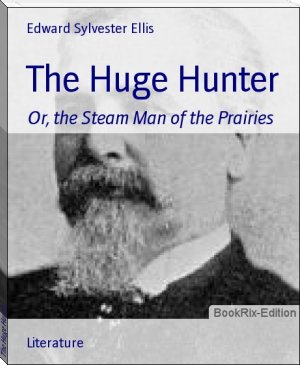The Life of Kit Carson: Hunter, Trapper, Guide, Indian Agent and Colonel U.S.A. by - (best motivational books to read TXT) 📗

- Author: -
Book online «The Life of Kit Carson: Hunter, Trapper, Guide, Indian Agent and Colonel U.S.A. by - (best motivational books to read TXT) 📗». Author -
"Kit seemed thoroughly familiar with Indian life and character, and it must be conceded, that no American of his time knew our aborigines better—if any so well. It must be set down to their credit, that he was their stout friend—no Boston philanthropist more so. He did not hesitate to say, that all our Indian troubles were caused originally by bad white men, if the truth were known, and was terribly severe on the brutalities and barbarities of the border. He said the Indians were very different from what they used to be, and were yearly becoming more so from contact with border ruffians and cowboys. He said he had lived for years among them with only occasional visits to the settlements, and he had never known an Indian to injure a Pale Face, where he did not deserve it; on the other hand, he had seen an Indian kill his brother even for insulting a white man in the old times. He insisted that Indians never commit outrages unless they are first provoked to them by the borderers, and that many of the peculiar and special atrocities with which they are charged are only their imitation of the bad acts of wicked white men. He pleaded for the Indians, as 'pore ignorant critters, who had no learnin', and didn't know no better,' whom we were daily robbing of their hunting grounds and homes, and solemnly asked: 'What der yer 'spose our Heavenly Father, who made both them and us, thinks of these things?' He was particularly severe upon Col. Chivington and the Sand Creek massacre of 1864, which was still fresh in the public mind, said he; 'jist to think of that dog Chivington, and his dirty hounds, up thar at Sand Creek! Whoever heerd of sich doings 'mong Christians!'
"'The pore Indians had the Stars and Stripes flying over them, our old flag thar, and they'd bin told down to Denver, that so long as they kept that flying they'd be safe enough. Well, then, one day along comes that durned Chivington and his cusses. They'd bin out several day's huntin' Hostiles, and couldn't find none nowhar, and if they had, they'd have skedaddled from 'em, you bet! So they jist lit upon these Friendlies, and massacreed 'em—yes, sir, literally massacreed 'em—in cold blood, in spite of our flag thar—yes, women and little children, even! Why, Senator Foster told me with his own lips (and him and his Committee come out yer from Washington, you know, and investigated this muss), that that thar durned miscreant and his men shot down squaws, and blew the brains out of little innocent children—pistoled little papooses in the arms of their dead mothers, and even worse than this!—them durned devils! and you call sich soldiers Christians, do ye? and pore Indians savages!'
"'I tell you what, friends; I don't like a hostile Red Skin any more than you do. And when they are hostile, I've fit 'em—fout 'em—and expect to fight 'em—hard as any man. That's my business. But I never yit drew a bead on a squaw or papoose, and I despise the man who would. 'Taint nateral for men to kill women and pore little children, and none but a coward or a dog would do it. Of course when we white men do sich awful things, why these pore ignorant critters don't know no better than to foller suit. Pore things! Pore things! I've seen as much of 'em as any man livin', and I can't help but pity 'em, right or wrong! They once owned all this country, yes, Plains and Mountains, buffalo and everything, but now they own next door to nuthin, and will soon be gone.'
"Alas, poor Kit! He has already 'gone to the Happy Hunting Grounds.' But the Indians had no truer friend, and Kit Carson would wish no prouder epitaph than this. In talking thus he would frequently get his grammar wrong, and his language was only the patois of the Border; but there was an eloquence in his eye, and a pathos in his voice, that would have touched a heart of stone, and a genuine manliness about him at all times, that would have won him hosts of friends anywhere. And so, Kit Carson, good friend, brave heart, generous soul, hail and farewell!
"Hoping these rough recollections may serve your purpose, I remain
"Very respectfully,
"Your obedient servant,
"JAMES F. RUSLING."
The following tribute to the matchless scout, hunter and guide is from the Salt Lake Tribune:
He wrote his own biography and left it where the edition will never grow dim. The alphabet he used was made of the rivers, the plains, the forests, and the eternal heights. He started in his youth with his face to the West; started toward where no trails had been blazed, where there was naught to meet him but the wilderness, the wild beast, and the still more savage man. He made his lonely camps by the rivers, and now it is a fiction with those who sleep on the same grounds that the waters in their flow murmur the great pathfinder's name. He followed the water courses to their sources, and guided by them, learned where the mountains bent their crests to make possible highways for the feet of men. He climbed the mountains and "disputed with the eagles of the crags" for points of observation; he met the wild beast and subdued him; he met the savage of the plains and of the hills, and, in his own person, gave him notice of his sovereignty in skill, in cunning and in courage. To the red man he was the voice of fate. In him they saw a materialized foreboding of their destiny. To them he was a voice crying the coming of a race against which they could not prevail; before which they were to be swept away.
End of Project Gutenberg's The Life of Kit Carson, by Edward S. Ellis





Comments (0)